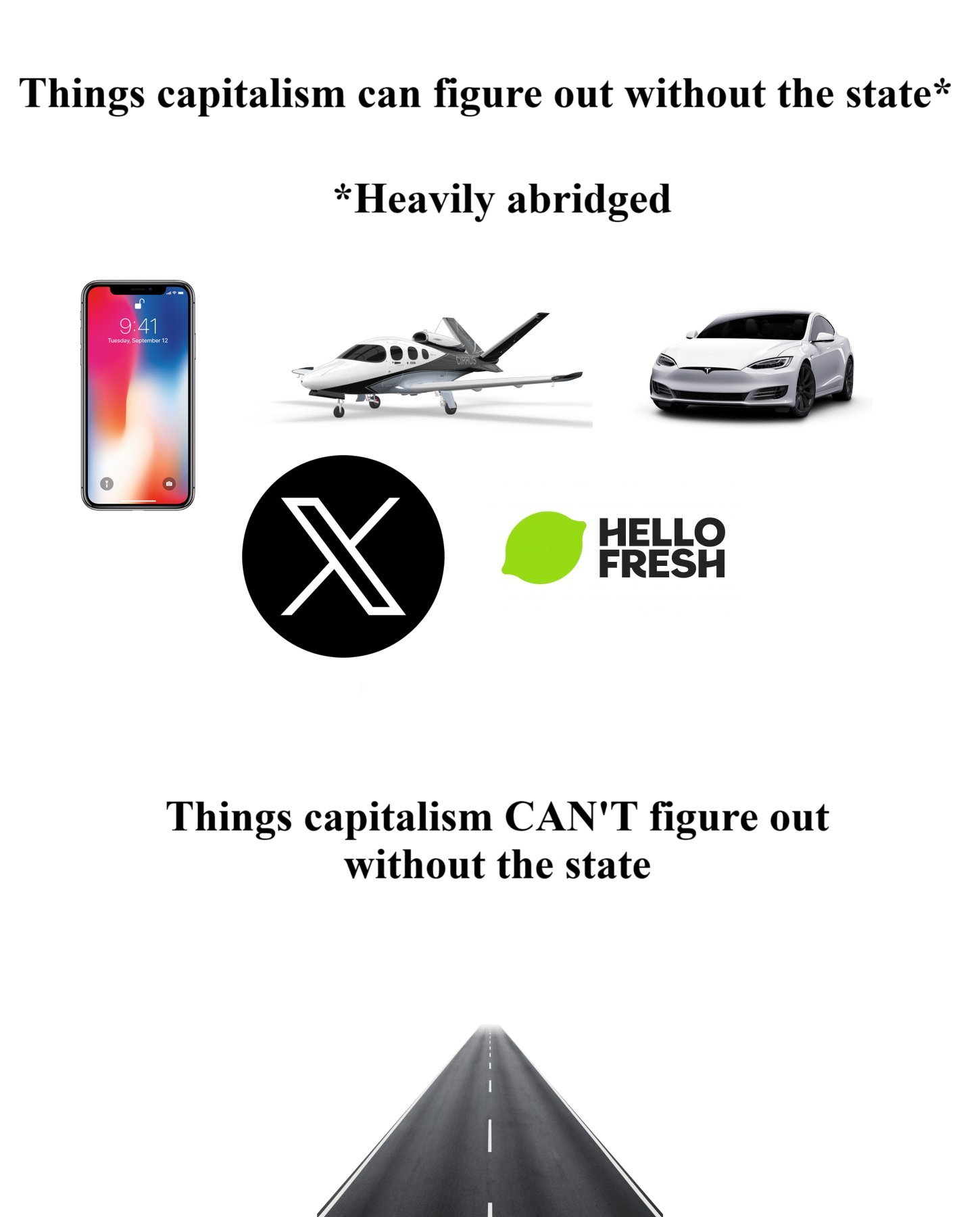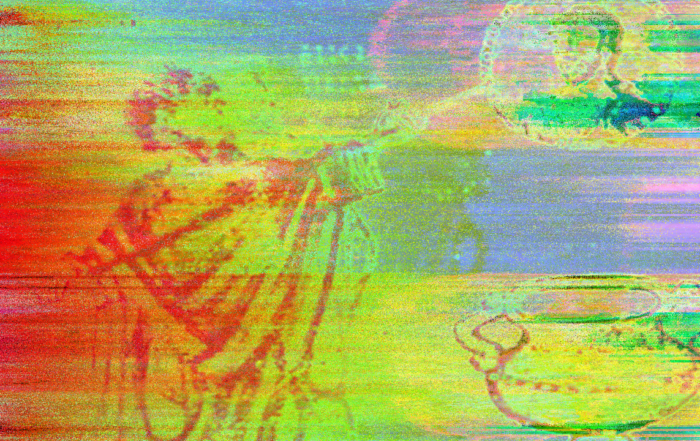Buy Lyrica Without Prescription Read the original post on X.
https://clinicacyrne.com/marcar-consulta/Tramadol Online Purchase Anarchists envision a society where solutions emerge through voluntary exchanges and free-market mechanisms, challenging the conventional belief that only a state can efficiently provide essential services. We are often criticized by statists who cannot imagine a world where the basic necessities of roads, police, and fire protection are supplied by anyone other than the state. However, as we delve into each aspect, it becomes apparent that innovative solutions and voluntary cooperation can easily solve the “roads” problem. Contrary to widespread skepticism, an anarchist society has the ability to address basic needs more efficiently and innovatively than traditional state-centric models.
Order Tramadol OvernightFirst, let’s address the question as to whom will provide “muh roadz” in anarchist societies. Simply put, they will be owned and operated by private companies. This gets met with the nonsensical idea that private roads would lead to toll booths at every driveway, holding residents hostage if they can’t pay. The market, however, driven by competition and consumer demand, would encourage innovative funding mechanisms to ensure accessibility for all. Private companies will explore options such as tolls, subscriptions, or voluntary contributions, each tailored to meet the diverse needs of individuals and communities. Far from the specter of oppressive toll booths, the market-driven nature of anarchist societies would incentivize low-cost solutions, as companies compete to provide efficient, affordable, and high-quality road services. The dynamics of supply and demand, often overlooked in the criticism of anarchist models, would pave the way for widespread, accessible, and well-maintained road networks.
https://doc-t.net/news-bits/https://twofunnelsaway.com/credit-versio/ Picture a bustling neighborhood where various private road management companies compete for residents’ business. Instead of facing toll booths at every turn, homeowners might subscribe to a local road service provider for a nominal monthly fee. This subscription could cover not only road maintenance but also include additional services like snow removal, landscaping, and even community events. The competition among these service providers would drive innovation and efficiency, ensuring that roads are well-maintained, accessible, and affordable. In this neighborhood, the harmony of well-kept roads seamlessly blends with the diverse array of services tailored to residents’ preferences, all made possible by the market forces that prioritize consumer satisfaction.
Buy Tramadol 100 Mg OnlinePeople likewise wonder how policing would be done without the state. In an anarchist society, the provision of security services takes a transformative turn towards decentralization and privatization. Security agencies, accountable to their customers rather than a nameless, faceless bureaucracy, compete to offer the best protection services. Rather than a monolithic police force with a monopoly on law enforcement, individuals can subscribe to private security firms or rely on community-based agreements. These security providers operate under voluntary contracts, ensuring that their services align with the specific needs and expectations of the residents they serve.
Buy Valium Online Without PrescriptionOrder Pregabalin Online Contrary to the dystopian narrative that envisions a world without state policing as chaotic and dangerous, anarchist societies prioritize the well-being of their residents through peaceful and voluntary means. The notion that emergency services would demand a credit card number before responding is a misrepresentation of the market-driven alternatives. In an anarchist community, individuals might extend their ADT subscription to include security services that offer rapid response times, advanced technology for crime prevention, and community-oriented policing. Without the shield of state authority, private security providers would rely on maintaining a positive reputation and satisfying their customers, effectively eliminating the likelihood of brutality and abuse that can occur when the state has a monopoly on force. Furthermore, as they would have a fiduciary duty to their clients, there would be an incentive to ensure recovery of stolen property, and firms would not have anything reminiscent of qualified immunity, or protecting problematic officers.
https://10bestforwomen.com/sharing-secrets/Other essential services, such as firefighting, likewise find new avenues for efficiency and innovation through private sector involvement. Private fire departments and firefighting services, driven by market forces, would compete to offer superior and cost-effective fire protection. Residents could subscribe to these services through subscription-based models or insurance plans that provide incentives for fire prevention. The competition among private fire services would not only lead to higher service quality but also foster cooperation to ensure comprehensive coverage in case of emergencies. Volunteer fire departments also currently exist, and would have a major place without the state’s involvement.
https://newzpad.com/chatgpt-shrugged/Tramadol Online Purchase Expanding the scope beyond firefighting, healthcare and other basic services can similarly thrive in a market-driven environment. Private healthcare systems and medical services, driven by the need to attract customers, would prioritize quality, accessibility, and affordability. Individuals could subscribe to healthcare plans that suit their needs, and voluntary community support and mutual aid networks could complement these private services, providing assistance to those facing financial hardships.
Ambien No PrescriptionBuy Tramadol Without Prescription Using free-market mechanisms for the provision of various essential services debunks the myth that only a centralized state can ensure their availability. Voluntary exchanges, competition, and cooperation among service providers create a dynamic and responsive ecosystem where the basic needs of individuals are met more efficiently than a monolithic and bureaucratic state apparatus could ever achieve.
https://www.foundeng.com/services/ I propose detailed solutions to these issues in my book, “The Liberty Solution.” The link can be found in my pinned tweet. The state wants to keep you in bondage, as they view you as nothing more than a tax slave. This is why they indoctrinate people into believing that without their existence, the world will fall into chaos and disorder. Anarchy is not chaos. Quite the contrary. Anarchism is the natural order of things, and despite the state’s claims, abolishing the criminal organization that rules over every aspect of our lives would necessarily make the world a better place.
Purchase Tramadol I will never hide my posts behind a Subscription on X. Please consider donating.
₿ – bc1q3m2gh3cfmp7hc99eak7qqgxnt9stxfletfe8v6
https://mcmeng.com/patrick-o-brien/ Ξ – 0xd7C435F772949052CB717162bE1C71989F6917d5



Leave A Comment